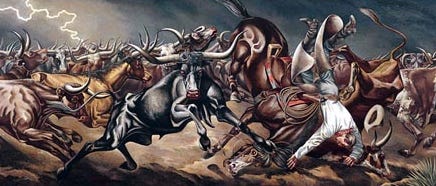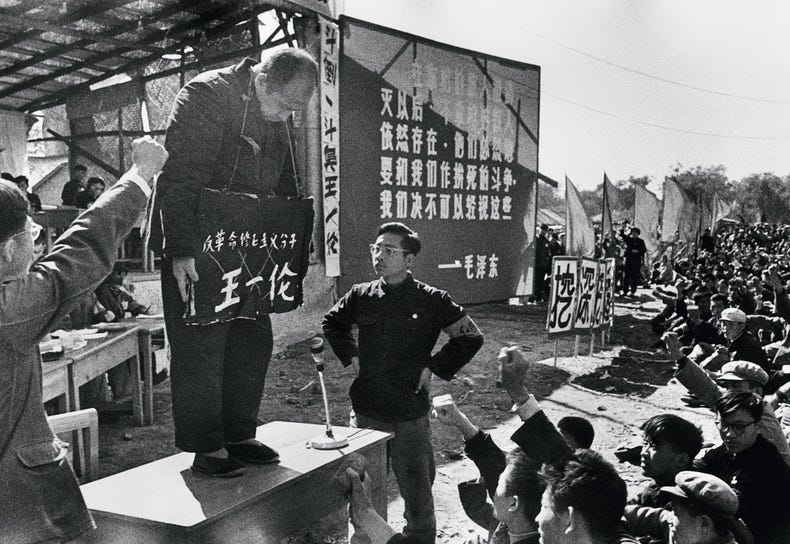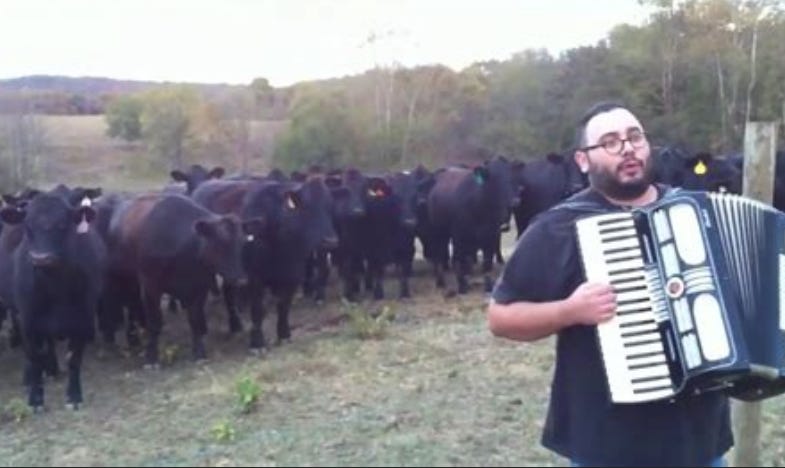I try to avoid the frantic daily dispatches from the battlefronts of the Coronavirus War. But forgoing my time with those breathless reporters speaking in hushed voices outside field command posts means I am blindsided by sudden shifts in the front lines. There was a consensus of the experts, as I understood it, only a week ago - facemasks were useless. Now everyone has to wear them. Did I miss Gettysburg or only the Skirmish at Little Relevance Creek? How quickly the ground shifts, how hard to sort the trivial from the consequential.
But the sudden about face on facemasks worries me. It is another building block in the sharpening mood, electricity in the air before a thunderstorm. It takes me back to memories of darkening summer afternoons around cattle. As a teenager, I spent a lot of time around cattle. Feeding cattle with my Dad is among my fondest memories of him. Spending time around cattle, developing a fondness for them, I became sensitive to their moods. One wonders if my comfort around cattle accounts for my lack of same with people.
As you hang around them, you get to know the cows, at least the more extroverted ones. They have individual personalities, but there are times, approaching thunderstorms come to mind, when cattle become a herd, almost as if they are no longer individuals but possessed of a mass mind. It is at such times that one steps lightly, taking care to avoid sudden moves or loud noises, as they easily stampede, mindlessly running in blind panic over you, through the corral walls or over an ill-placed cliff.

I sense that same electricity now in the Coronavirus War. Just as with a herd of cattle, the atmosphere begins with just a few individuals, the easily excitable ones. But as they begin to low and pace nervously, their mood spreads. Soon the entire herd is on their feet and snorting, pawing the ground or simply pushing into each other in nervous exercises of dominance.
It takes only an ill-timed noise or crash of thunder to set the herd in motion. When the herd stampedes, any animal not moving with the herd gets trampled under. When the herd stampedes, right, wrong, wise, foolish, none of that matters. The herd sweeps all before it.
This thing about public facemasks is spooky because it seems something a herd might do just before it stampedes. A facemask may be useless in preventing the spread of coronavirus, but it is a visible sign that you are a member in good standing of the herd. It is virtue signaling made mandatory.
Human beings don’t stampede blindly across the prairie like panicked cattle. Panicked human beings stampede by purging themselves of the unfortunate different. Human beings seek to appease the blind forces of nature, in the person of their angry gods, by sacrificing their children to Moloch, holding witch trials or engaging in the Cultural Revolution’s “struggle sessions”.

So are facemasks a sign that the herd is going to stampede? Or is it wisdom on the part of our leaders, an effort to calm the herd? Old time cowboys know that riding around the edges of a herd, singing in a soothing voice can have a calming effect on nervous cattle, a practice giving birth to the folklore of the singing cowboy. Early film stars like Gene Autry and Roy Rogers were expressions of that folklore.
Perhaps our leaders are wiser than cynics like myself give them credit for. Cowboys, and wise human leaders, know that keeping the most excitable individuals in the herd either calmed or isolated is necessary to prevent a general stampede. On a cattle drive, the nervous animal can be cut out from the herd, serenaded or serve as beef on the hoof for the chuck wagon.
Not so with human beings, at least not anymore. The rise of social media has equipped the most excitable members of the human herd with high gain amplifiers. The rise of the liability tort bar and powerful corporate HR departments has given muscle to this emerging power of the excitable.
The human being with common sense, sober and reasonable, has little presence on social media and is of little concern to the liability lawyer or HR commissar. It is the narcissist, the hypochondriac, the sentimental, the emotional, the easily touched that reverberate at high amplification into the herd.
And when the thunderclouds gather on the horizon, the electricity in the air grows into a visible presence and the nervous excitement from these high gain antennas echo through the herd. Everyone, even the sober curmudgeon, grows nervous as the herd begins to jostle.
It is in the rootless urban neighborhoods of Adorable America that the battle for the hearts and minds of the Home Front in the Coronavirus War is fought. The grand strategies of the Coronavirus War ill-focus on Deplorable America, who remain just doing their job or simply hunkered down trying to survive the financial catastrophe.
In the burbs and suburbs of Adorable America, anonymity is a way of life. But now, in the face of danger, these nervous but powerfully emotive soldiers need reassurance that the faceless neighbor next door is not a traitor or member of a fifth column, carelessly flouting the draconian siege warfare tactics ordained by the high command.

Doubtless, the faceless boffins advising our leaders have been long aware of the power of virtue signaling in creating community among the rootless itinerants of urban America. We have been creating community by virtue signaling for a long time now. Fawning over a fellow coffee drinker’s dog, subtly introduced as a “rescue dog”, at Starbuck’s assures everyone in the vicinity that you are a good citizen of Adorable America.
And so it may be that the abrupt about face on facemasks was caused by our leader’s recognition that the excitable members of the human herd were creating dangerous levels of nervousness. Perhaps facemasks are the today’s urban equivalent of the cowboy’s “Get Along Little Dogies” of the fondly remembered open range. Or maybe our leaders are just ready to panic themselves.
But whether you are excitable, nervous, skeptical or simply a bemused observer of the human herd growing fearful of a stampede, the words of the Apostle Paul are sound advice for these troubled times:
“rejoice in hope, persevere in tribulation, be devoted to prayer, contribute to the needs of others, practice hospitality. . . rejoice with those who rejoice and weep with those who weep. Do not be wise in your own regard. Respect what is right in the sight of others and, if possible, so far as it depends on you, be at peace with all men.”
I think St. Paul is telling us to wear our facemasks.



